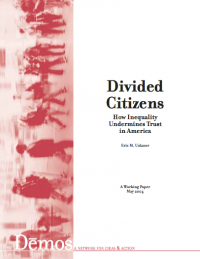An exploration of the importance of social trust in U.S. society and troubling ways in which rising economic inequality since the 1970s has helped to decrease trust between Americans.
Executive Summary
Americans face twin crises of social solidarity. The first is a crisis of declining trust. The second is one of increasing inequality. This working paper explores how these two problems are part of the same syndrome. The increasing gap between the rich and the poor undermines trust and tears at our social fabric. Key points of the paper include:
The share of Americans who believe that "most people can be trusted" has fallen from 58 percent the first time the question was asked in a national survey in 1960 to less than 35 percent in 2003.
Economic inequality in the United States has risen by 17 percent from 1960 to 2002. The income distribution in the United States has become substantially more unequal in the last 40 years, and today's levels of inequality rival those seen in the 1920s.
Rising inequality leads to mistrust for two reasons. First, people are less likely to be optimistic and believe that they can control their own fate in a period of growing inequality. Growing pessimism and perception of limited resources leads to a less generous attitudes toward others. Second, growing inequality weakens social bonds. Trust is based upon the belief that we are all in this together, part of a "moral community." It is tough to convince people in a highly stratified society that the rich and the poor share common values, much less a common fate.
Trust is important for creating more generosity and compassion in society. People who trust others -- and see themselves as living in the same moral community with all their fellow citizens -- are more likely to be concerned about the misfortunes of strangers. They will seek to better the lives of those who have less, either by favoring government programs to redress grievances or, even more critically, by giving their own time and money.
Trust is the most important factor shaping giving to human services charities. As Americans' empathy for people who are different has fallen, we have redirected our charitable contributions. We give more to charities which directly benefit people like ourselves, such as cultural institutions, and less to charities that help strangers, such as human service organizations.
Trust is also important for creating greater tolerance. People with faith in others value diversity within the context of common understandings. Trusters are far less likely than mistrusters to be suspicious of people who are different from the mainstream culture. For example, trusters are more supportive of affirmative action and gay rights. The trend toward growing tolerance in American society in recent decades would have been stronger if inequality hadn't been growing at the same time.
Fostering greater trust in American society requires economic policies to reduce income inequality.
Trust can also be strengthened in other ways. Trust rises with more education -- and especially college education. Every study of trust (and every student of trust) finds powerful effects of education on faith in fellow citizens. Extra years of schooling may be the most effective way to increase trust.
Efforts to foster more trust will be most effective when targeted at young people, whose attitudes remain malleable. Getting youth involved in volunteering is an excellent way of building trust. So is getting young people to reach out to groups different from themselves. Adolescents who have a friend of an opposite race become more trusting adults.
